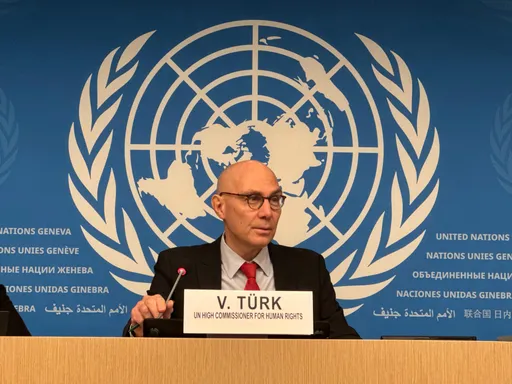As a huge wave of refugees flee after Russia’s invasion, Israel will ease the path for Jewish Ukrainians to immigrate, but the policy has one significant caveat. The country’s Interior Ministry has announced that only ‘halachic’ Jewish Ukrainians - those who are born to Jewish mothers - would be accepted into the country, it has been reported. Previously, under Israel's Law of Return, every grandchild of a Jew is eligible to immigrate to Israel with their family and be granted citizenship.
Under Israeli law, Jews who want to immigrate to Israel are asked to bring their families along if they also want to benefit from citizenship rights. If they stay behind, they’re not allowed to apply separately, later.
Ukraine has prohibited men between the ages of 18 and 60 to leave the country during the war.
Revealing the decision during a session by the Knesset Constitution, Law and Justice Committee on Monday, the Interior Ministry decided that it would allow non-Jewish Ukrainian partners and children only if they're Jewish by the religious law.
Under the previous policy, some 200,000 people in Ukraine were eligible for immigration to Israel, but it is unclear how many have been ineligible because of the new restriction.
Criticism
Even though the Interior Ministry said the decision was taken to assist the families of Jewish Ukrainian men who can’t leave the country, some criticised the policy as discriminatory.
“This is the first time I can remember that the Law of Return creates two different categories of eligible individuals,” Haaretz quoted Gilad Kariv of the Labour Party, the Knesset committee chair saying.
“Until now, eligible individuals have always enjoyed the same exact rights,” he said.
On February 24, Russia launched a full-scale invasion of Ukraine, causing at least 660,000 refugees to flee the country, according to the United Nations. Predicting ‘Europe’s largest refugee crisis this century’, the UN said on Tuesday that four million could leave the country if the situation deteriorates further. While the majority of refugees crossed to Poland, followed by Hungary, Moldova, Romania and Slovakia, many Jewish Ukrainians are seeking ways to get to Israel.
On the day of the invasion, Israel’s Jewish Agency set up a hotline to assist the process for Ukrainians, according to a report by The Times of Israel. In just three days the line has been flooded with around 5,000 calls from Ukrainian Jews with half of them requesting to immigrate. A total of 3,100 Ukrainians immigrated to Israel last year.
Two days after Russian tanks rolled into the country, the organisation announced setting up six processing stations in Poland, Moldova, Romania and Hungary, all countries sharing borders with Ukraine.
Ukraine disappointed by Israel’s lack of support
Since the beginning of the Russian invasion, Ukraine's Jewish President Volodymyr Zelenskyy has been asking for Israel’s support. Israeli officials, on the other hand, have been attempting to pursue a careful policy of balance between Russia and Ukraine, condemning the Russian attack while carefully stating that Israel has good relations with both parties of war.
Disappointed by Israel’s lack of diplomatic and moral support to Ukraine, Kiev meanwhile said Zelenskyy was expecting more from Israel.
Ukraine’s ambassador to Israel, Yevgen Korniychuk, said on Monday that Ukrainians who arrived in Israel were asked to prove their intention to leave ‘so that they don't turn into illegal residents or refugees'.
"This is not acceptable. Hungary, Poland and Slovakia have allowed hundreds of thousands of our citizens to enter without papers. This is absolutely insane," Korniychuk said, calling on Israeli authorities to allow non-Jewish Ukrainians to enter the country as well during the war.























